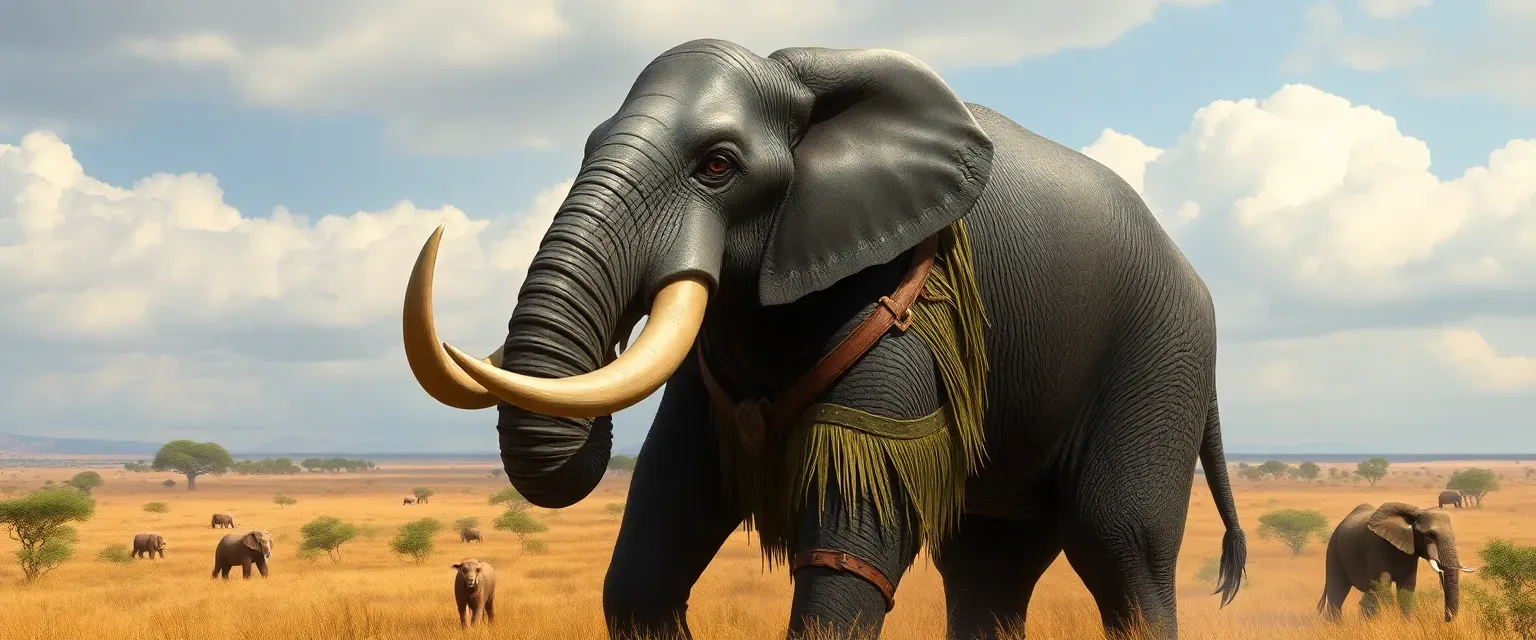Thragg was a towering figure among the loxodon folk of the sun-baked savannas of Zendikar, his hide a weathered gray etched with the scars of countless skirmishes, like ancient runes carved by the claws of forgotten beasts. At forty-seven summers, he stood nearly nine feet tall, his trunk a sinuous banner of strength that curled with deliberate grace, and his tusks, polished to a gleam from years of honing against stone, curved like scimitars ready to defend the weak. His eyes burned with an inner fire, deep amber pools that flickered with unyielding conviction, and his massive ears, fringed with ritual beads of bone and feather, flapped softly in the hot winds as if echoing the heartbeat of the land itself. He draped himself in simple leathers stitched from the hides of prowling hyenas, adorned with iron bands forged in the communal fires of his herd, and a cloak of woven grasses that whispered against his broad back as he moved with the ponderous certainty of a mountain stirred to life.
Born in the shadow of the great elder trees where the loxodon herds gathered to commune with the spirits of the earth, Thragg's beliefs were as unyielding as the bedrock beneath the plains. He spoke in casual absolutes, his voice a rumbling thunder that brooked no nuance—right was the path of honor, wrong the abyss of depravity—and many whispered that the loxodon mind, vast and ancient, simply could not fathom the treacherous grays of mortal compromise. Fire coursed through his veins, not the blaze of rage, but a fervent passion for justice that ignited whenever tyranny reared its head among the nomadic tribes. He wanted nothing more than to forge a lasting peace for his people, to bind the fractious herds into a single unbreakable circle where the young could thrive without the specter of raiders or famine.
Yet peace eluded him, thwarted by the encroaching human warlords from the coastal cities, their ironclad legions hungry for the fertile grazing lands and the mystic crystals hidden in the earth. These invaders saw the loxodons not as equals, but as obstacles, their straightforward ways dismissed as barbaric simplicity. Thragg's unswerving earnestness blinded him to the subtle alliances and betrayals that wove through enemy camps; he charged forward with trunk raised and tusks bared, rallying his kin in thunderous calls that shook the dust from the horizon. He forged pacts with unlikely allies—feral leopards tamed by his unyielding will, and even a rogue skyknight who glimpsed the fire in his eyes—and led daring raids that turned the tide of skirmishes, his strategies born not of cunning deceit but of pure, blazing resolve that inspired even the weariest warrior to stand taller.
It worked because Thragg embodied the soul of the savanna: immovable, yet alive with the pulse of the wild. His absolute faith drew followers like moths to flame, forging bonds stronger than any treaty scrawled on parchment. But conflicts gnawed at him—the doubt of his own daughter, who yearned for the nuanced ways of the cities; the betrayal of a herd elder swayed by promises of gold; and the endless cycle of vengeance that his fire only seemed to fuel. In the end, as the sun dipped blood-red over the final battle's pyres, Thragg fell not to a blade, but to the weight of his own unyielding heart, his body a monument amid the grasses, his spirit whispering absolutes to the winds that carried his people's fragile hope forward. His arc was one of tragic fervor, a hero whose virtue became his chain, binding him to a world that demanded shades he could never see.
